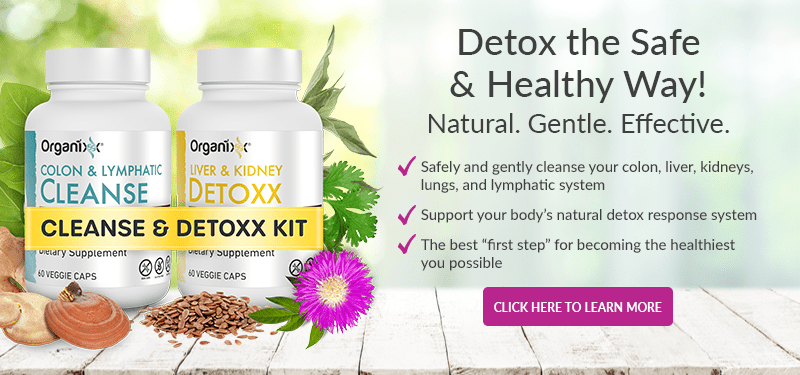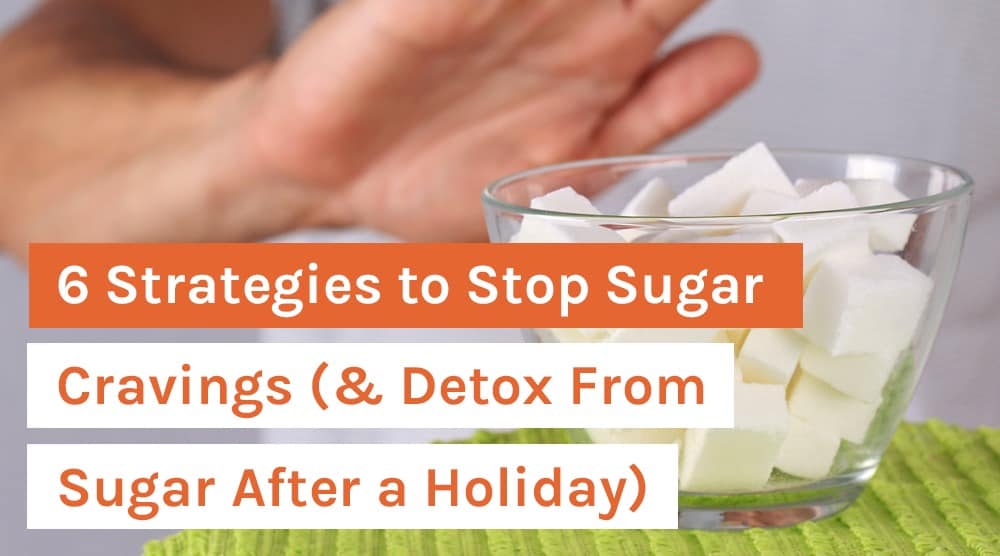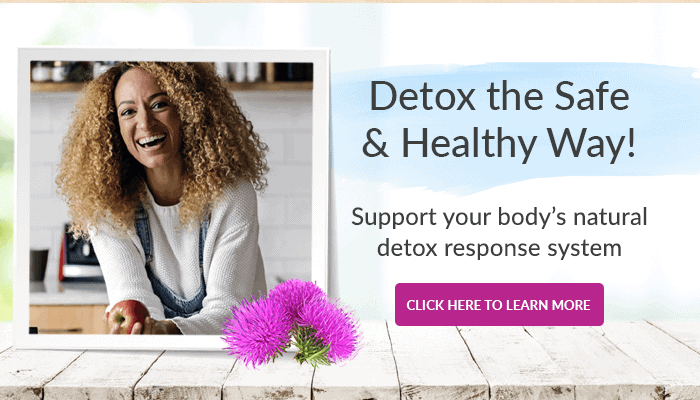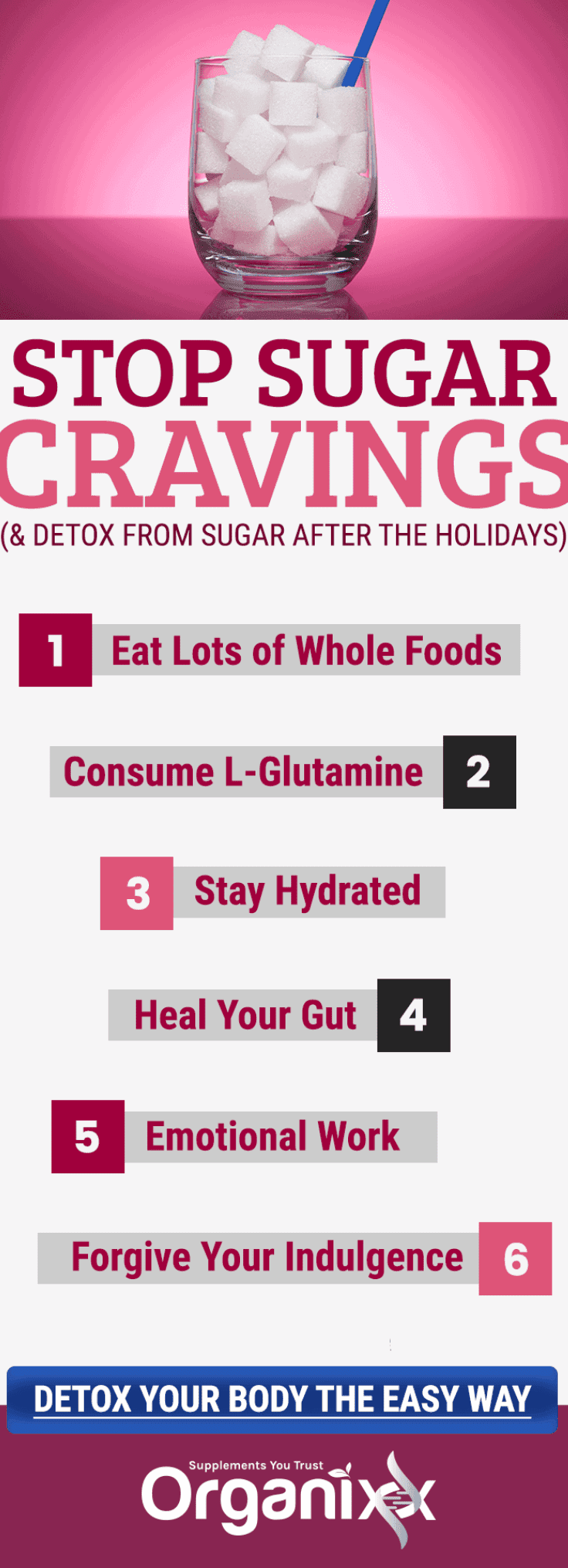6 Strategies to Stop Sugar Cravings (& Detox From Sugar After a Holiday)
In a hurry? Click here to read the Article Summary...
Indulging in sugary foods and beverages is a common occurrence during the holidays, vacations, and other special times of the year. But once these events are over, many people want to know how to stop sugar cravings, detox from sugar, and get their healthy eating plan back on track.
A little in-depth education and a few easy-to-do actions with regard to the many forms of sugar we consume can help us make wise choices with all the sweet foods and beverages – both during holiday times and throughout the year.
The #1 Worst Sugar to Consume
Let’s get the really bad news out of the way first. One of the worst substances you can consume for your health can be summed up in four words: high fructose corn syrup.
Isn’t that just another form of sugar? you may ask. Yes, and then again, definitely no.
When the cravings hit, indulging in too much of any kind of substance that breaks down quickly into glucose is going to tax your body. We will get into that in more detail a little later in this article.
High Fructose Corn Syrup (HFCS), however, is a particularly nasty form of sugar because of the way it is processed and what kinds of products are used to create it.
Other names for HFCS are:
- corn syrup
- maize syrup
- glucose/fructose syrup
- tapioca syrup
- crystalline fructose
- fruit fructose
- added sugars
Whatever name it goes under, the process of making HFCS is basically the same. HFCS is created by allowing certain enzymes to break cornstarch down into tiny molecular substances.
It is cheap to make – in large part because the U.S. Department of Agriculture gives subsidies to farmers who intentionally overproduce commercial corn in order to create it.
High fructose corn syrup is made exclusively from genetically modified (GMO) corn. Here are a few factoids that will help motivate you to stay clear of anything made with HFCS:
- HFCS consumption is linked to autism, Parkinson’s, Alzheimer’s, anxiety/depression, and other brain conditions since it has been known to affect the hypothalamus and other key areas of the brain and endocrine system.
Corn is often genetically modified to be “Roundup Ready” and many experts conclude that Roundup is the main cause for HFCS’s neurotoxicity effects. - Studies also link HFCS with higher cancer risk, in large part because of its GMO connection. A 2008 Chilean study made the link between organophosphate insecticides, hormonal imbalance, and cell mutations.
- As the name implies, HFCS is a form of fructose, which many people may recognize as the form of sugar also found in fruit. The GMO risks withstanding, HFCS may be one of the culprits in the epidemic-sized rise in fatty liver disease amongst non-alcoholics.
Fructose is exclusively processed in the liver. HFCS contains unnaturally high concentrations of fructose minus the fiber and other phytonutrients found in fruit so the liver has to do double-duty to break it down. This means more fat stored in this particular organ, and more risk for disease. - HFCS can also contain unhealthy amounts of mercury, which is derived from the chemical processing used to separate the corn from the husk.
Conventional institutions have claimed that the amount of mercury used in this process would not be enough to cause adverse health effects.
Considering that one out of every ten calories that the average American consumes comes from HFCS and the fact that the damaging effects of mercury toxicity are accumulative, many experts are skeptical of this claim.
Studies have shown that even trace amounts of mercury can cause neurological damage and raise cancer risk.
What About Other Sources of Sugar?
Since the 1970s, American food manufacturers have increasingly used HFCS to sweeten everything from the obvious (cakes, cookies, candy, soda pop, juice) to the obscure (bread, ketchup, and salad dressings to name a few).
As the stats above make clear, it’s a no-brainer that to stay healthy during the holidays and at any other time, it’s best to simply steer clear of the stuff.
Most of us also know about the detrimental effects of artificial sweeteners, so we will not go into that here. But what about plain table sugar, natural cane sugar, and brown sugar? Do these sugar sources also pose a threat?
Unfortunately, the studies are clear about the risks of overindulging in these sweeteners as well. All of them are a form of sucrose, which is a synthetically-derived combination of fructose and glucose. It is hard for the body to process sucrose since it must first separate out the two substances before it can be absorbed by the body.
A 2016 study conducted by MD Anderson Cancer Center was one of the first to look at sucrose’s effect on internal inflammatory mechanisms. Their research has shown that sucrose ingestion had an effect on 12-lipoxygenase enzyme pathways, which can turn on production of detrimental fatty acids. The result is higher inflammation overall.
The MD Anderson study concluded that high consumption of sucrose can lead to higher cancer risk. Other studies have made the same claim between sucrose consumption, immune system depletion, and insulin resistance, which can lead to other diseases, especially diabetes.
How to Stop Sugar Cravings: 6 Strategies
Being exposed to more sugar-laden substances during the holidays may be inevitable, but giving in to the urge to consume them doesn’t have to be. Here are six easy ways to tame your sugar cravings right now:
#1: Boost Your Consumption of Whole Foods.
Upping your consumption of fresh, organic, whole foods such as green leafy vegetables and cruciferous vegetables can not only help your body’s detoxification pathways, but it can also provide extra fiber, vitamins, and minerals.
Protein-rich grass-fed meats and sources of high-quality healthy fat such as avocados and coconut oil can also help curb food cravings.
#2: Consume L-Glutamine.
L-Glutamine is an essential amino acid, meaning that we have to get it from an external source. Glutamine helps with brain function, rebuilds and repairs muscles, fights infections, and is essential for gut health.
It has also been shown to burn fat, heal the gut from stomach ulcers and leaky gut, strengthen the immune system, detox the entire body on a deep level, and balance blood sugar levels.
For thousands of individuals trying to kick the sugar habit, it has also been a real friend. Consistent research has provided proof of its effectiveness in fighting cravings, especially for sugar and alcohol.
#3: Stay Hydrated.
Addictive behaviors, especially regarding sugar, can intensify when we are dehydrated. At the first sign of a sugar craving (or when you are face to face with leftover Christmas cookies), drink a tall glass of water, with lemon if possible.
Be sure to consume at least half your weight (in ounces) in fresh, filtered water each day and start your morning with an 8 oz. glass of lemon water upon arising. Drinking water is extremely helpful for flushing and detoxifying your liver on the day after an indulgence, too.
#4: Heal Your Gut.
Especially if you have consumed a little more sugar or high-carb foods for a day or two, your “gut microbiome” may be moderately to severely out of whack.
Support your digestive system and restore balance by reaching for probiotic and prebiotic foods such as raw cultured vegetables, sauerkraut, low-sugar kombucha, bone broth, raw kefir and yogurt (if you are not dairy intolerant).
Adding probiotic supplements to your daily regimen is a good overall strategy for boosting your gut health, maintaining strong immunity, and cutting cravings as well.
#5: Emotional Work.
Food is tied to so many emotionally-charged moments in our lives. Take the time to reflect post-holiday season and discover the real reason why sugar has such a draw for you.
When you are in crisis or stressed, does eating cake, cookies, ice cream, or potato chips give you comfort? Do you eat these foods when you are experiencing specific emotions such as anger or sadness or when you want to celebrate?
In addition, don’t rule out a physiological addiction to sugar. A 2007 study found that when given the choice between sugary water and cocaine, laboratory rats picked the sugar water every time, whether it was natural (e.g., a piece of fruit), artificial (e.g., HFCS), or fake (e.g., saccharin).
In fact, many food manufacturers use food additives and sweeteners such as HFCS to intentionally create addiction, all in the name of selling more of their product.
You don’t have to be a victim of immoral commercial practices, however. Reach out to others in person or online to get the support you need. And continue to educate yourself about the detrimental effects of sugar on your overall system. You CAN have a healthy relationship with the foods that you enjoy, including the sugary ones!
#6: Be Kind to Yourself if You Happen to Indulge.
Even with a conscious effort to stop eating unhealthy foods and not giving into sugar cravings, the occasional indulgence (or overindulgence) will still often happen. When it does, the best thing to do is to learn from the experience and move on.
Being overcome with guilt and self-criticism will only cause you to stress out more. In the long run, this can cause more inflammation and weight gain. If you go back to the nutritional plan that is best for you after “falling off the wagon,” you can start fresh with little damage done.
Also, just because the holidays (or vacation) are over doesn’t mean you should stop doing enjoyable activities. Due to the “happy hormones” that are produced when seeing new sights, doing exciting things, and visiting with those you love, you may actually find that indulging in moderation when you are enjoying yourself may not cause the weight gain or the detrimental health effects you may expect.
Just be sure to return to your baseline nutritional plan if you do consume a treat and continue to stay hydrated for ongoing detoxification.
Recipe: Dairy-Free, Sugar-Free Peppermint Mocha Latte
 This is a wonderfully refreshing cold-weather treat when served hot or serve over ice in warm weather.
This is a wonderfully refreshing cold-weather treat when served hot or serve over ice in warm weather.
The peppermint soothes the stomach and the cacao powder is high in many essential vitamins and minerals as well as fiber.
The coconut oil provides a boost of healthy fat that can energize and satiate as well.
Here’s what you’ll need:
- 1 cup of organic decaf or caffeinated coffee
- 2 tablespoons raw cacao (not cocoa) powder*
- ½ tablespoon coconut oil
- Pinch of sea salt
- 1 drop supplement grade peppermint essential oil
- Stevia to taste (optional)
Brew coffee. Combine with all other ingredients and blend for about 15 seconds. Sprinkle with additional cacao powder on top if you want and enjoy!
Optional: for straight hot “cocoa,” you can omit the coffee and use either hot coconut milk or almond milk instead.
(*Cacao powder is made from unroasted cocoa beans, which means it has more gut-friendly enzymes and nutrients than its roasted cousin cocoa. Cocoa is what you’ll find on most grocery store shelves and is usually full of added sugar. Raw cacao is available at health food stores and online.)
Organixx Cleanse & Detoxx is a two-step formula that provides a gentle yet powerful full-body detox using organic botanical ingredients. Supports naturally purging your body of toxins, chemicals, free radicals, heavy metals, waste, as well as bacteria, and pesticides. Easily cleanse your colon, liver, kidneys, lungs, and lymphatic system that may result in increased energy, and better digestion with more nutrient absorption, in addition to improved immunity, mental clarity, and overall health and wellbeing.

 Sources:
Sources:
Article Summary
High Fructose Corn Syrup (HFCS) is a particularly nasty form of sugar because of the way it is processed and what kinds of products are used to create it.
HFCS consumption is linked to autism, Parkinson’s, Alzheimer’s, anxiety/depression, and other brain conditions.
HFCS can also contain unhealthy amounts of mercury, which is derived from the chemical processing used to separate the corn from the husk.
A study concluded that high consumption of sucrose can lead to higher cancer risk.
6 strategies for curbing the sugar habit:
- Boost your consumption of whole foods
- Consume L-glutamine
- Stay hydrated
- Heal your gut
- Emotional work
- Be kind to yourself if you indulge






“The Truth About Coconut Oil” article explains pretty well about how it’s saturated fats are bad for LDL and the heart. Coconut milk can be a healthy thing though!
“The Truth About Coconut Oil” article explains pretty well about how it. It’s saturated fats are bad for cholesterol and the heart. Coconut milk can be a healthy thing though!
Thanks for not linking this info to some sales pitch: an indispensable component to the successful reduction of sugar intake. My discovery of how to deal with inflammation and the sugar consumption “sweet-tooth” lifestyle came late in life driven by the pain in my joints and not wanting to replace them. I went cold-turkey and could have benefited from a plan like this. Ultimately I made it through and now am a student of our microbiome and especially the Vegas Nerve which is the mind/gut connection that both causes the cravings and their cessation. The Vegas Nerve makes it possible to get important feedback that promises to allow us to read our body’s needs intuitively and ultimately take charge of our own health and cures. (IMHO)
Can anyone help me, want a Organic recipe book.
Refering to your Mocha Latte and its raw cacao, wouldn't the benefits of using raw cacao
be reduced in Hot drink.